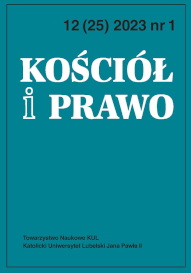Błąd co do nierozerwalności małżeństwa (kan. 1099 KPK) a wykluczenie nierozerwalności małżeństwa (kan. 1101 § 2 KPK) w świetle doktryny i orzecznictwa
Error as to the Indissolubility of Marriage (Can. 1099 CIC) and the Exclusion of the Indissolubility of Marriage (can. 1101 § 2 CIC) in the Light of the Doctrine and Jurisprudence
Author(s): Wojciech GóralskiSubject(s): Christian Theology and Religion, Family and social welfare, Canon Law / Church Law, Sociology of Religion
Published by: Towarzystwo Naukowe KUL & Katolicki Uniwersytet Lubelski Jana Pawła II
Keywords: marriage; legal error as to indissolubility; exclusion of indissolubility; autonomy of legal error;
Summary/Abstract: After the promulgation of the CIC/83, the problem of the mutual relation of can. 1099 CIC/83, as modified from can. 1084 CIC/17 (a legal error concerning the indissolubility of marriage; the modification was the clause “dummodo non determinet voluntatem”) and can. 1101 § 2 CIC/83 (exclusion by a positive act of will, inter alia, of the indissolubility of marriage). In essence, the question is whether error iuris constitutes an autonomous title of nullity of a marriage, or it amounts to a simulation act. The debate in this regard covered both the doctrine and the jurisprudence of the Roman Rota, It should be noted that by excluding the indissolubility of marriage (can. 1101 § 2 CIC/83), the spouse is fully aware that this union is indissoluble, but nevertheless this quality exclude a positive act of the will. Thus, there is a discrepancy between the external act (marital consent) and the object of the will (dissolvable marriage). Meanwhile, according to can. 1099 CIC/83 the nupturient is in error as to the indissolubility of marriage (he is convinced that marriage is dissolvable, not knowing any other form of marriage). One should definitely recognize the autonomy of error iuris (this view dominates both in the doctrine and in the case law of judgment). At the same time, it should be emphasized that determination of the will by error does not mean that the contractor does not have a positive act of will, as indicated by the words can. 1099 CIC/83 “dummodo non determinet voluntatem”. Error itself (as with can. 1096 CIC/83) does not nullify matrimonial consent, requiring the intervention of the will (the will is determined by error). The act of will to contract a dissolvable marriage, which is not a simulation act, is the actual intention of the counterparty towards a false (dissolvable) marriage. When it comes to this intervention of the will, it can be assumed that the error that determines the will to a dissolvable marriage (known to the contractor as the only one) constitutes de facto – implicite – the exclusion of indissolubility. Indeed, the intention to conclude a dissolvable marriage as a reality contrary to a true marriage (including an element inconsistent with the marriage institution in the subject of marriage consent) results in the implicit exclusion of the latter.
Journal: Kościół i Prawo
- Issue Year: 12/2023
- Issue No: 1
- Page Range: 187-212
- Page Count: 26
- Language: Polish

